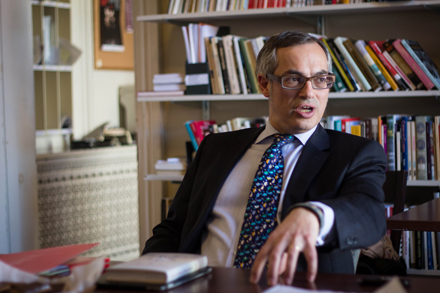
By McGill Reporter Staff
About 25 McGill students took part last Friday in an informal discussion on government and politics with the Honourable Tony Clement, President of the Treasury Board and Conservative MP for Parry Sound-Muskoka (Ontario).
Clement, in town to address the Board of Trade of Metropolitan Montreal to highlight the benefits of the Government of Canada’s Economic Action Plan 2013 and efforts to cut red tape, was the guest of the McGill Institute for the Study of Canada (MISC). The discussion, held in MISC’s Peel St. offices, was also attended by Dean of Arts Christopher Manfredi, current MISC Director and Communications professor Will Straw, and past MISC Director and political science professor Antonia Maioni.
The students, whose numbers included several Political Science majors, listened as Clement spoke briefly on the scope, reach and overall functioning of the Treasury Board and his role as its President, and gave an overview on how the government operates as a whole.
In the question and answer session that followed, participants asked the Minister questions on a number of topics including the origination of policy, open data, the recent controversy involving the Parliamentary Budget Officer, the influence of individual Members of Parliament on policy formation, the role of the Prime Minister’s Office in the current government and his own political future.
Following the discussion, Clement told the Reporter how important for him it was to hold discussions of this kind with students, something he would like to do more of.
“I think it’s really part of my job actually, to engage with them, to get their perspective, their point of view,” said Clement, who is also the Minister for the Federal Economic Development Initiative for Northern Ontario (FedNor). “I enjoy doing it. I really love the interaction. They’re fearless, so that’s good. You’re not going to get ‘how do you like it in Montreal today’. You’re going to get substantive questions.
“When I look back at 30 years ago when I was going through my university degrees, having that interaction with people who were actually making decisions… that part of Political Science is important too. The book part is important. The research part and analysis part are important. But having access to people who are real practitioners sure gives you a different and more varied perspective on your discipline.”
Clement, who completed degrees in Political Science (1983) and Law (1986) from the University of Toronto, said government today needs people from varied backgrounds and disciplines.
“The more varied, the better, I think. Obviously facility in other languages is always better than one or two. Different disciplines bring different things to the table,” Clement said. “When I look around the cabinet room or the caucus room, we’ve got people who who, if they were lawyers they may have been Crown or defence attorneys. Or if they were in business they were in big business or small business. We’ve got some teachers and some ex-police officers. We’ve got people who spent some time outside the country as well as inside the country. So, really, it’s that breadth of experience that is important. But more important than the discipline that you came from is your ability to critically analyse a situation and arrive. We get paid to make decisions, right? When you make decisions you have to make the analysis and then decide. That’s the most critical skill to have.”
Clement concluded his McGill visit by meeting with University officials, including Christopher Manfredi and Vice-Principal (Research and International Relations) Rosie Goldstein.
